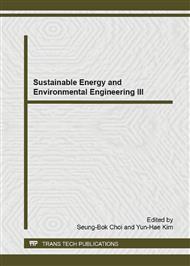p.483
p.487
p.491
p.498
p.504
p.508
p.512
p.516
p.520
Effects of Substitution Ratio on the Emission Characteristics of a Dual-Fuel Engine Fueled with Pilot Diesel Fuel and Methanol
Abstract:
Substitution ratio is an important parameter influencing on the performance of dual-fuel engine. In order to study the effects of substitution ratio on the emission characteristics of diesel/ methanol dual-fuel engine, a 6-cylinder turbocharged diesel engine was converted into a dual-fuel engine fueled with pilot diesel fuel and methanol. Methanol was injected into the intake pipe and ignited by pilot diesel fuel. Experiments were performed at a constant speed of 1400 r/min, and at three different engine loads of 40%, 60% and 100%. The experimental results indicate that CO and HC emissions of dual-fuel mode both increase significantly with the increase of substitution ratio, and are higher than those of diesel mode. Compared to diesel mode, dual-fuel mode generates lower NOx and smoke emissions. In addition, as substitution ratio increases, NOx and smoke emissions are decreased.
Info:
Periodical:
Pages:
504-507
Citation:
Online since:
March 2015
Authors:
Keywords:
Price:
Сopyright:
© 2015 Trans Tech Publications Ltd. All Rights Reserved
Share:
Citation:


